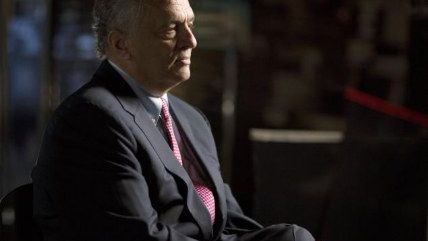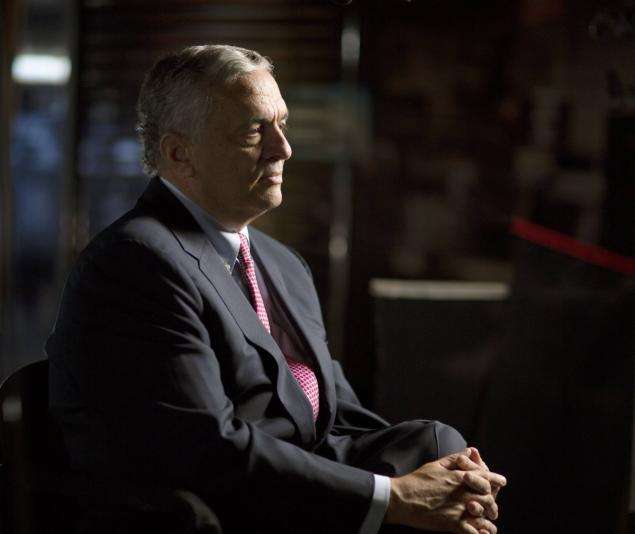Showtime Documentary Presses CIA Leaders on Drones, Torture
The Spymasters helps viewers understand the mindset behind controversial decisions.


The Spymasters—CIA in the Crosshairs. Showtime. Saturday, November 28, 9 p.m.
Pardon the unintended wordplay, but the signature moment of Showtime's remarkable new documentary, The Spymasters—CIA In The Crosshairs, comes near its end, when a producer asks Mike Morrell, the agency's former acting director, about the implications of what are known in the killer-drone biz as "signature strikes"—missile attacks on unidentified people not because they're known terrorists, but because a drone operator thinks they might be based on the fact that they're carrying weapons or otherwise behaving suspiciously.
Morrell, earnest and cooperative until now, declares flatly that he's not going to say a word about signature strikes. As the production crew prepares to take a break, Morrell shakes his head incredulously. "I don't believe these [CIA] directors are talking about this stuff!" he says in a tone of wonder.
And yet they are, and not in background sessions with friendly reporters that will dribble out in unattributed quotes that can safely be denied, either. A dozen men who have headed the CIA—including John Brennan, the current director—appear on camera in Crosshairs, granting searching interviews on the agency's part in the war on terror over the past two decades.
The result is a fascinating window into the thinking at the top of a compulsively secret agency that has been the spearhead of the war on terror. There is probably some lying going on in Crosshairs (though probably no more, and possibly even less, than if you interviewed a dozen randomly chosen members of Congress) and certainly some spinning.
But there's also surprising candor. John Deutch, one of Bill Clinton's CIA directors, asked about the indefinite confinement of Al Qaeda suspects at Guantanamo Bay, bluntly calls it a humanitarian advance. "The old way would have been to put them in the back of a truck and shoot them," he says.
The interviews are sometimes testy. Jose Rodriguez, the agency's former chief of operations, is explaining that its so-called black sites—secret prisons where captured Al-Qaeda suspects were brutally interrogated—were used because they were more secure than other possible locations. He's interrupted by a producer who suggests an alternative explanation: "You wanted to be able to abuse this guy, you didn't want any rules." Retorts the CIA man with some heat: "Bullshit!"
Other times there is rambunctious (albeit long-distance; the interviews were conducted separately) disagreement among the officials themselves. That's particularly true in the lengthy debate over waterboarding, sleep deprivation and other forms of "enhanced interrogation" that look, to the non-national-security eye, remarkably like torture.
The CIA directors who spent most of their careers elsewhere before being appointed to head the agency vigorously disapprove of it. "Our constitution does prohibit cruel and unusual punishment," says William Webster, a former federal judge and FBI director appointed CIA chief by Ronald Reagan. "If it's cruel, we shouldn't be doing it." Obama appointee David Petraeus, who had plenty of experience with prisoner interrogations during his 37 years in the army, doubts the efficacy of torture: "If you want information from a detainee, you become his best friend. … It's a long process."
But time, say several of the directors who rose through the clandestine ranks, was what the CIA—already widely accused of an "intelligence disaster"—didn't have in the wake of 9/11. "These are the hardened, worst terrorists, responsible for the deaths of thousands of Americans, in a period where we simply didn't believe we had time to become their best friends," says George Tenet, who served under Clinton and George W. Bush. And, Tenet and others say, the rough stuff did produce valuable information, notwithstanding the findings of a sharply divided Senate committee to the contrary. (They also note that the Senate seems curiously unconcerned about either the morality or the intelligence-gathering effectiveness of Obama's thousands of drone assassinations.)
The policy debates in Crosshairs are both cogent and framed in real-world terms rather than lofty moral generalities. But this documentary is much more than an exercise in video wonkery. Like the best journalism, it's festooned with arresting anecdotes, from a detailed description of what it's to like blow something up from the controls of a drone to vivid character sketches of men on both sides of the war.
Among the most memorable bits is the account of the questioning of 9/11 mastermind Khalid Sheikh Mohammed provided by CIA operations chief Rodriguez, who describes him methodically ticking off 10 seconds on his fingers during each waterboarding, having figured out early on that that was when the water stopped. What really broke KSM, as he's universally known to his captors, was sleep deprivation. "Afterwards," Rodriguez says, "he wouldn't stop talking."
Rodriguez himself is one of the more indelible personalities in Crosshairs. The most remorselessly hard-case government security officer since G. Gordon Liddy's rat-roasting days, he sees not the slightest contradiction between his insistence that waterboarding was torture and his admission that (against CIA orders) he torched a stack of videos of the interrogations because "I knew the tapes would play as if we were all psychopaths."
The narrative skills on display in Crosshairs are hardly surprising; the producers include several veterans of 60 Minutes, the horrifying CBS broadcast 9/11, and other cream-of-the-TV-crop documentary series that have perfected the art of brisk, high-impact story-telling.
They have put together a show that is intelligent and engaging every step of the way. Crosshairs is a nuanced account of the moral and intellectual complexities of back-alley warfare against a vicious, implacable enemy that does not wear uniforms or move its troops around in a way that can be charted with battle lines on a map.
Much of what the CIA officials say in Crosshairs will not be accepted by critics of the national security state, in some cases rightly so. But their arguments are far more thoughtful and challenging than many of those critics acknowledge; these are not a bunch of yahoos from the kill-em-all- let-God-sort-'em-out school of global strategy. In fact, quite the reverse: One of the most startling sequences in Crosshairs is a montage near the end in which half a dozen or more of the former directors say, virtually in unison, that the U.S. government cannot kill its way out of this conundrum. What can it do? The rest, unfortunately, is silence.
Editor's Note: As of February 29, 2024, commenting privileges on reason.com posts are limited to Reason Plus subscribers. Past commenters are grandfathered in for a temporary period. Subscribe here to preserve your ability to comment. Your Reason Plus subscription also gives you an ad-free version of reason.com, along with full access to the digital edition and archives of Reason magazine. We request that comments be civil and on-topic. We do not moderate or assume any responsibility for comments, which are owned by the readers who post them. Comments do not represent the views of reason.com or Reason Foundation. We reserve the right to delete any comment and ban commenters for any reason at any time. Comments may only be edited within 5 minutes of posting. Report abuses.
Please to post comments


OT: We need to form a database of people that commit terrorist acts like we've seen today and if it's proven that they are a threat to national security they should be deported. Anyone that is pro-life is a suspect. They *all*-- including grandma-- can't be trusted.
I think we should direct police forces in proportion to threat. Therefore, I think we should allocate law enforcement resources in the same ratio as the number of people killed by right-wing wackos vs. Islamic wackos in the last decade. That would be ok, right?
That won't do the job American Pyscho.
The majority of the mass shooting killers have all turned out to be some version of leftist activists nut jobs on anti depressants Matching the right winger killers dollar for dollar would leave the devout Muslim jihadists nutjobs free rein.
Fuck the police, man. If you are a crazy religious extremist and lock yourself inside a building, and then the police kill you in a shoot out it proves the police are fascists. That's what I learned from Timothy mcveigh so I know its true.
AMSOC it appears you are having a nervous breakdown. There is a really nice, and sweet guy on this board named Agile Cyborg. A true poet, and all around good person. Maybe someone can get him in touch with you in order to talk you down.
I think you are a piece of shit, but hey maybe even you can be redeemed.
What? Are you defending the government murdering people because of their religion? Do you think it was kosher to use tanks and helicopters and burn to death dozens of innocents at Waco?
obviously it depends entirely on the religion. and the partisan political narrative.
"'Our constitution does prohibit cruel and unusual punishment," says William Webster,'" thinking the editor needs another pass over the article.
I'm making over $7k a month working part time. I kept hearing other people tell me how much money they can make online so I decided to look into it. Well, it was all true and has totally changed my life. For further details, Check this link............. http://www.earni8.com